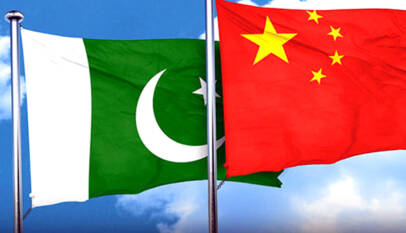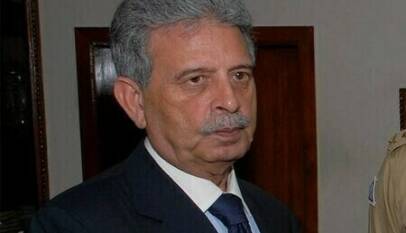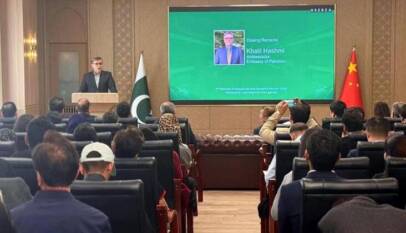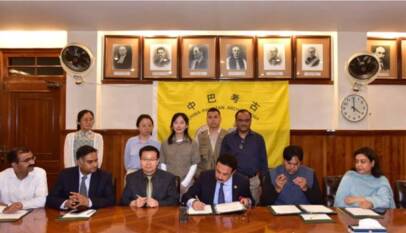Pakistan to benefit from Chinese expertise to boost exports and operate SEZs, says Minister Ahsan Iqbal
Minister for Planning and Development Ahsan Iqbal said China Pakistan Economic Corridor (CPEC) has given economic dimension to China-Pakistan relationship. Addressing a seminar in Islamabad, he said the corridor project shifted Pakistan’s focus from geo politics to geo-economics. He said under the CPEC, energy and road infrastructure projects were prioritized. The Minister for Planning said under this mega project, eight thousand megawatts of electricity was added to the system and this also helped made Thar Coal a productive asset.
ISLAMABAD, Jul 18 (APP): Minister for Planning, Development and Special Initiatives Professor Ahsan Iqbal on Tuesday said China would provide Pakistan with technical ‘know-how’ and expertise to increase exports and help successful execution of the Special Economic Zones (SEZs), under the CPEC project.
“We have requested China not to give us fish, [but] teach us how to catch the fish. Pakistan wants Chinese assistance to increase its exports and in successful execution of the SEZs. So China has promised to attach its experts [with quarters concerned in Pakistan],” he said while addressing an international seminar here.
The seminar titled “China-Pakistan Economic Corridor at Ten: A Gateway to Regional Connectivity,” was organized by Islamabad Policy Research Institute (IPRI).
IPRI President Ambassador Dr Raza Muhammad, Director Pakistan Institute of China Studies (PICS) Sargodha University Fazul ur Rehman, former SAPM on CPEC Affairs Khalid Mansoor, Director China Institute of Contemporary International Relations (CICIR) Dr Hu ShiSheng and Sohail Malik of Team Lead Climate Resourcing Coordination Center (CRC)among the leading speakers who spoke at a panel discussion of the seminar and highlighted significance of China-Pakistan relations besides various aspects of the game-changer CPEC project.
The panel discussion was moderated by Assistant Professor, Quaid-e-Azam University (QAU) Dr Salma Malik.
The minister said China had a vast experience in these sectors as it itself attained economic progress by increasing exports and establish vibrant industrial units besides having global chains for marketing its products.
Ahsan Iqbal said Pakistan needed export-oriented policies if wanted to have sustainable economic growth, stressing for clamping ‘export emergency’ to get exponential exports not incremental ones.
He also highlighted the importance to have surplus production of various items to increase the country’s exports as otherwise it could cause ‘local market distortion.”
“Next phase of the CPEC is business-to-business cooperation, not the government-to-government. Now we have to move towards industrial cooperation”, he added.
Elaborating, the minister said first phase of the China-Pakistan Economic Corridor (CPEC) project, initiated in 2013, was the infrastructure development by 2022, the second phase was industrialization from 2020 to 2025 and the third one was regional integration from 2025-30.
He said the incumbent government had revived the CPEC project, which faced slow-pace during the four years of the PTI government, expressing confidence it would be game changer not only for Pakistan but the whole region.
Now, he said Gulf countries were showing keen interest to invest in diverse fields of Pakistan including agriculture, mining, information technology and energy, for which a Special Investment Facilitation Council had been set up.
The minister said the country needed at least 10-year policy consistency to get the fruits of any development project.
During 2013-18, Ahsan Iqbal said the Pakistan Muslim League-Nawaz achieved great progress in the energy sector and produced around 11500 megawatts of additional electricity under the CPEC and non-CPEC projects and pulled the country out of 18-20 hours of load-shedding.
Now, the incumbent government under the leadership of Prime Minister Shehbaz Sharif also put the country on a path of economic stability and started completing the CPEC project at a faster pace.
He mentioned the CPEC projects in detail which helped in producing energy by different means, establishing a vibrant road and rail infrastructure across the country, special economic zones and laying of fiber optic cable for high-speed broadband services in remote areas and social welfare projects especially in Gwadar, an ultimate destination of the CPEC.
The minister said the CPEC had emerged as one of Pakistan’s most successful and transformative projects, ushering in a new era of regional connectivity and economic prosperity.
Recalling the inception of CPEC, Ahsan Iqbal highlighted that the project was proposed after the 2013 elections in Pakistan when the Chinese Premier extended the visionary concept to the newly elected Prime Minister Muhammad Nawaz Sharif.
This led to the signing of a memorandum of understanding during Nawaz Sharif’s visit to China in July 2013, establishing the joint coordination cooperation committee (JCC) to drive the implementation of CPEC.
Underlining the political will behind CPEC, Ahsan Iqbal pointed out that the MoU was swiftly followed by the first JCC meeting in August 2013.
“This remarkable start marked the beginning of an institutional mechanism for advancing CPEC, paving the way for significant progress in subsequent years,” he added.
He said it was the transformative impact of CPEC that China became the top foreign direct investor in Pakistan within just three years of the project’s initiation.
The minister said “This shift elevated China from a close political ally to a key economic partner, emphasizing the transition from geopolitics to geo-economics.”
Pakistan Embassy in Beijing launches landmark mentorship programme to empower youth
The Embassy of Pakistan in Beijing on Sunday successfully organized the 2nd Pakistan Profe…












